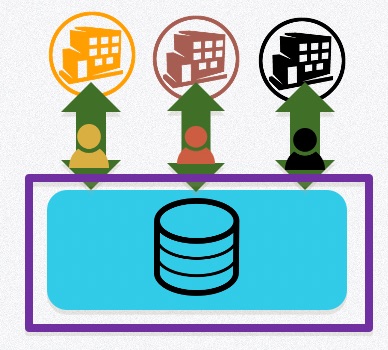There are numerous reasons organisations are interested in data sharing. However, deduplication is one of the most common reasons. This is the second part of a short series of posts looking at different options for data sharing especially for deduplication purposes.
Model 1 was centralised model with a central data layer ‘owned’ or ‘control’ by a single agency. Model 2 is still has a central data layer, but this time the data layer is held in ‘common’.

This model seeks to address the issue of power by holding the data layer in common as opposed to being ‘owned’ by a single entity. One method of doing this would be to establish a data trust to hold the data layer. The data trust would have trustees from various stakeholders whose role would be to manage the trust according to its agreed purpose. The people about whom the data is could also fulfil trustee roles enabling them to have greater say in how their data is used. The beneficiaries could have access to the data about them if the articles of the trust permit it.
Because the data is held in common in the trust, so is the liability. Therefore the liability burden for individual organisations reduces. However, some may view their liability as increasing because the data trust is not under their direct control. Each organisation sharing data with data trust has flexible technology options as long as the data meets the standards laid out by the trust.
Additionally, because the data layer sits ‘outside’ of any one organisation, this model potentially enables sharing across different legal jurisdictions. Similar to Model 1, there are various options for which data is shared for deduplication.
While this option helps address aspects of power, there will no doubt be power struggles between trustees. This option is new to the humanitarian community and is viewed by some as too complex and some resist the idea of setting up something new. However, Trusts have existed for nearly 1000 years and data trusts are used in other industries, so there is much to learn from.
So while they are new, I believe they are worth testing and exploring before writing them off.

0 Comments